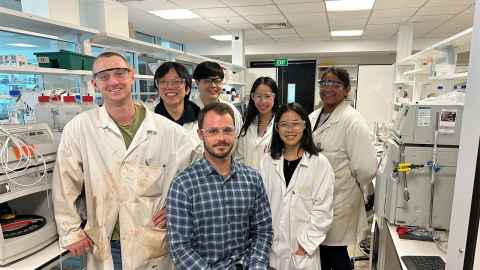Take 10 with... Alan Cameron
Dr Alan Cameron, School of Chemical Sciences, gives us 10 minutes of his time to discuss his research into combatting and leveraging infectious disease with new chemistries.

1. Describe your research topic to us in 10 words or less.
Combatting and leveraging infectious disease with new chemistries.
2. Now explain it in everyday terms!
My research is about developing chemical methods to construct or modify chemical scaffolds with important biological activities, with a particular focus on biomolecules like peptides. These methods can be used in many ways. We are aiming to create new agents to fight or prevent infectious diseases, or to leverage infectious diseases to selectively target cancer in biotechnology approaches.
3. Describe some of your day-to-day research activities.
I engage with PhD and BSc(Hons) students on a daily basis by troubleshooting chemical reactions, discussing project directions or entirely new reaction ideas, and preparing manuscripts from their research successes. Grant writing, reading emerging literature, and discussions with collaborators make up the remainder of my daily activities.
4. What do you enjoy most about your research?
I most enjoy working with such an enthusiastic and talented group of students. I always have something to learn from them. They constantly ask questions that make me re-evaluate or search for further information. Guiding these students and seeing them make exciting discoveries with unexpected or undocumented chemical reactions is something I take great joy from. I am also fortunate to have a network of collaborators who are passionate scientists and make our discussions exciting and diverse. Being an associate investigator within the Maurice Wilkins Centre has played a huge part in forming these networks.
5. Tell us something that has surprised or amused you in the course of your research.
Seeing students develop independence and take onboard both literature and my advice is very satisfying. Sometimes it is also most amusing when my expectations or suggestions are completely wrong. I’m sure it is extra satisfying for them too!
6. How have you approached any challenges you’ve faced in your research?
We face challenges in chemical synthesis, reaction development, and medicinal chemistry on a daily basis. Some can be overcome relatively quickly, while others require extraordinary resilience and repeated experiments with minor modifications to unravel the mystery. I always think critically when project planning to ensure there are alternative options in these cases.
7. What questions have emerged as a result?
Many of the challenges that I have encountered in research have led to serendipitous discoveries. One example is a by-product from a reaction which took months to successfully eliminate. I began to wonder ‘what is this by-product?’. The by-product revealed unexpected and exciting chemical reactivity, leading to the questions ‘can we drive the reaction to form the by-product as the sole product?’ and ‘can we turn these initial failures into successes?’. This has led to an entirely new research project that has formed a new international collaboration, received external funding, and may gain Intellectual Property (IP) protection.
8. What kind of impact do you hope your research will have?
I hope to have impacts both within academia and a more real-world context. However, the greatest ambition for my research is to see one of our medicinal candidates reach clinical trial and perhaps have some real-world impact. Together with a PhD candidate, we have just identified an exciting antibiotic lead that is showing real promise in vitro, including in organoids. We are just moving towards in vivo trials with collaborators at the University of Otago.
9. If you collaborate across the faculty or University, or outside the University, who do you work with and how does it benefit your research?
I am fortunate to collaborate with several academics within and outside the University. These collaborations are instrumental to the success of my research and keep it exciting and diverse. Within the School of Chemical Sciences, I have worked with Dame Margaret Brimble, Paul Harris and Erin Leitao. Within the School of Biological Sciences, I work with Chris Squire, Paul Young and Rod Dunbar. Within the University I also work with Veronika Sander, Alan Davidson, Thomas Proft and Catherine Tsai at the Faculty of Medical and Health Sciences. Outside the University, I work with academics at the University of Otago, Victoria University of Wellington, the Cawthron Institute, MPI and have recently partnered with Ngātiwai, the iwi from which my father’s side of our family descends. Internationally, I work with academics at the University of Melbourne and at Wesleyan University in the United States.
10. What one piece of advice would you give your younger, less experienced research self?
Less is more when it comes to written work. Spare the details. Focus on an exciting and coherent story. Plan your experiments (even years in advance) to build this story. Do not chase only what you think will work or is exciting. Be systematic. Fill in all the pages of the story as you go, so you don’t have to do it later when it comes time to tell the tale.